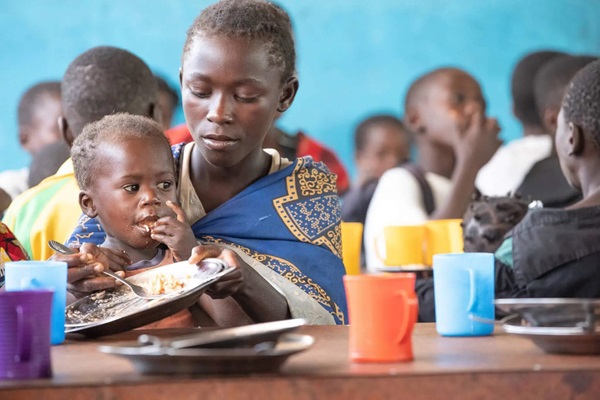MALANJE, EAST ANGOLA – Greetings from the Quéssua Mission in East Angola. I have worked for 10 years here as the agriculturist for the United Methodist Quéssua Agriculture Center. Though this site with its church, schools, hospital and farm was torn down to the ground during three decades of war that finally ended in 2002, we are rebuilding all aspects of the mission – with help from many partners, including Global Ministries.
My particular passion and calling from God is to continue to develop a productive and sustainable farm that also sustains the community. I am thankful to God for keeping me strong and committed to this ministry. I believe that God calls us together to the mission of serving the most vulnerable in our communities. To this end, we completed a large new chicken coop this year to ramp up our egg production.
The main goal of the project is to raise chickens for eggs to support malnourished children in the villages and contribute to the Sunday school children’s meal. This will provide extra protein and nutrients to the healthy meal, including produce from the farm, that is diligently prepared under the direction of missionary partners who lead the children’s meal mission in Quéssua. This is a challenging goal when between 600 to 800 village children are fed each Saturday and Sunday. Just a year ago, we served 400 to 600, so the need and our project has multiplied.
Chronic poverty contributes to a high rate of perpetually undernourished children. Most Quéssua village households can only manage to provide one meal per day. Toddlers are particularly vulnerable, and most children attend school with no breakfast. Some often go without eating a meal for a day or more. Imagine going to school with no breakfast, snack or the hope of lunch. These weekly meals are very impactful for the children, so we are doing our best to keep up with the demand.
Villagers also come to the farm to purchase eggs; two, three or five eggs at a time, with which they make an affordable, tasty, nutritious sauce that serves as a protein rich meal for the whole family. Eggs replace the usual dried fish sauce which many families can no longer afford. Families have their own unique recipes for using the eggs. We thank God that we can provide them to people at an affordable price.
The demand for eggs has grown, making us contemplate the need for increasing our production. The challenge that we are facing to accomplish this is the availability of chicken feed. The cost has increased with the deteriorating economy. We pray and believe that with God’s blessing and wider church support for our projects, we will keep moving forward.
Yambasu agriculture update
East Angola Episcopal Area is participating in the Yambasu Agriculture Initiative and has received a food security grant from Global Ministries to increase income levels of smallholder farmers through agriculture, specifically through maize (corn) and pig production. Quéssua agriculture is a project site for this work. A new piggery was constructed a couple years ago, and pig production is well underway.
The village communities we serve receive vegetable seeds from the Quéssua farm each planting season and we follow up with them on methods to successfully cultivate these. Sometimes one or two of the communities have disappointing seed beds resulting in poor harvests, so, we decided to plant the seeds in a farm nursery and once the seedlings are ready, community members come to receive seedlings to transplant into their individual gardens.
This was a positive and productive experience and hopefully a learning one. The community spirit of the people, singing together as they arrive with their leader to receive their seedlings, is heartwarming and gratifying. During a visit to one of the gardens we were thrilled to see villagers preparing harvested vegetables for sale.
We also still provide seeds to communities along with training and tools. The happiness on the peoples’ faces while receiving the seedlings gives us a sign that they really needed them. They cannot afford to buy the seeds, yet they need the vegetables for their own consumption and the quantities they are given will help them have some extra produce to sell, enabling the purchase of other needed items for their families.
Agriculture is an important mission at Quéssua. In addition to providing meals for children and seeds and seedlings for nearby villages, the agriculture center also undergirds the whole mission, supplying produce, animals, eggs and peanuts to the schools, theological center and hospital. “For as in one body we have many members, and not all the members have the same function, so we, who are many, are one body in Christ, and individually we are members one of another.” (Romans 12:4-5). Thank you to all who support this ministry with prayer, gifts and service.
Kutela Katembo Dieudonne, from the Democratic Republic of the Congo, has served as a United Methodist missionary at Quéssua since 2014. He is married to Fatuma Nana Katembo, who is also a missionary serving as agriculture technician in the West Angola Episcopal Area. They have five children.
Global Missionaries
Global Ministries missionaries are a tangible connection between The United Methodist Church and mission. Through denominational or ecumenical ministries, missionaries bear witness to God’s presence all around the world. They are called by God and sent out to serve by the church, usually placed in a new cultural context beyond their country of origin. Missionaries engage in ministry that is defined by mutuality and partnership, seeking to expand the mission of God already present and active in people and places. Explore the work of Global Ministries missionaries.
Support the ministries of missionaries working around the world, Advance # 00779Z.
Originally published by Global Ministries. Republished with permission by ResourceUMC.

